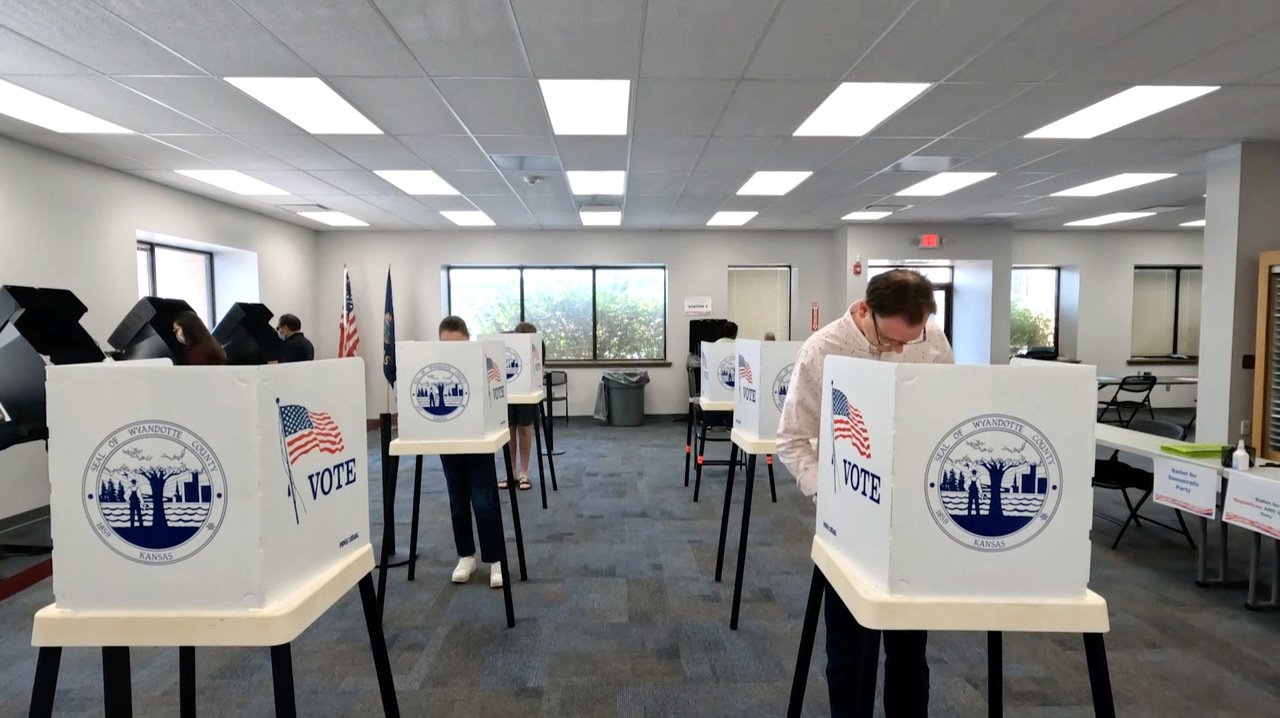The Economy and Polarisation: U.S. Prepares for Midterm Elections
In the upcoming November elections to the U.S. Congress, the Democrats are struggling to maintain control of both chambers, which would make it easier for President Joe Biden to continue his political agenda. The Republicans’ goal is to take control of at least one chamber. Gaining a majority in the House of Representatives would clear the way for them to fight for the presidency and full control of Congress in 2024. The issues playing the greatest role in the political debate before the elections are the state of the U.S. economy, the fight against crime and gun access, the right to abortion, and the scope of social and health care.
 ERIC COX/Reuters/Forum
ERIC COX/Reuters/Forum
The elections, which will be held on 8 November, are traditionally referred to as the midterms because they are held in the middle of the president’s four-year term. At the federal level, all 435 members of the House of Representatives and a third of the 100-seat Senate are up for election. The results of the midterms are of great importance for the president and his administration, as a favourable balance of power in Congress will translate into efficiency in tasks where cooperation between the executive and the legislature is essential. At stake for these elections for the Democratic Party is to maintain control in the House and the Senate. The Democrats have 220 seats in the House (at least 218 required for the majority) and 50 seats in the Senate (although at least 51 is necessary for the majority, the Senate is controlled by the Democrats via the tie-breaking vote of Vice President Kamala Harris, who constitutionally also serves as the president of the Senate). In turn, the Republicans must take back at least one of the chambers to effectively block the implementation of President Biden’s actions for the remaining two years of his term in office and strengthen their candidate in the presidential election.
With the elections to the House organised in individual districts (the number of which varies by state), the main issues in the campaigns are domestic matters, including local issues. The most likely scenario is that the Democrats will maintain control over the Senate (in the 50-50 division). In June and July, the Republicans were forecasted to pick up 51 seats. The Republicans though have a good chance of winning a majority in the House, although the forecasted number of seats it will win—around 229—is lower than earlier polls from June and July (predicted 236-238 seats).
Issues Important to Democrats
The Supreme Court’s decision in June (Dobbs v. Jackson Women’s Health Organization) that invalidated the 1973 Roe v. Wade judgment, thus abolishing the constitutional right to abortion and leaving this issue to each state or the federal government to decide, turned out to be a top issue for the Democrats in the campaigns. Some states then began to implement laws limiting abortion in the first or second trimesters of pregnancy, as well as full prohibitions in the third trimester. Access to abortion has become the central theme of the Democrats’ campaigns. After the announcement of the Dobbs decision, the overall proportion of women among newly registered voters rose from 50% to 55%.
Democrats also point to the wider access to healthcare and social services, extended under Biden’s presidency due to the COVID-19 pandemic. They point to the threat from Republicans who would prefer to reduce their scope. Limiting gun access also remains high on the Democrats’ list of political priorities, especially after the tragic mass shootings in Uvalde (Texas), Buffalo (New York), and Highland Park (Illinois). These topics, along with the economy and the fight against crime, are among the most relevant to the general public. Democrats also raise the issue of the threat to American democracy from Donald Trump and his supporters, citing the attack on the Capitol in January 2021 and their non-recognition of the 2020 election result.
The Democrats’ election chances improved in August with the adoption of the Inflation Reduction Act (IRA), which completed a scaled-down version of Biden’s Build Back Better election programme. This effect was also strengthened by the president’s decision to cancel student loans (up to $20,000 in certain cases), which may affect up to 43 million Americans, including the complete cancellation of the student debt of about 20 million Americans (currently blocked by a court order). Biden’s pardoning of those convicted under federal law of minor marijuana possession (affecting around 6,500 people) may also have a minor effect on the election results. Taken together, these decisions may induce some younger, more liberal voters to go to the polls in an election in which turnout will be key. Despite all this, support for Biden remains low (40% in October), therefore individual candidates are distancing themselves from the president and focusing on their own merits.
Republican Campaign Topics
The leading theme of the Republicans’ campaign is the unstable economic situation related to high inflation. Inflation, including food and energy prices, peaked in June at 9.1%, and in the following months it slowed somewhat, reaching 8.2% in September. The Federal Reserve (the Fed) raised the key interest rate five times in the last year to 3.25%—the last time it was this high was in 2008. However, due to the higher-than-forecasted, upward trend in core inflation, further rate hikes by the Fed are likely. Republicans argue that the increasing inflation, which was 1.4% in January 2021, was the result of Biden’s actions and the injection of several trillion dollars into the economy through reform programmes (however, a significant part of these funds was intended to stimulate the economy and directly support citizens during the COVID-19 pandemic). They also say that inflation will continue to be driven by the subsidies and relief included in the IRA and by Biden’s decision on student loans, both of which they opposed.
Other Issues
Among the electoral topics, foreign policy is playing a greater role than usual, which is related to Russia’s invasion of Ukraine; in March, the war was one of the main topics in public opinion polls. However, this topic will not be significant in the results of the elections in most competitive races. There was, however, an incident in the Democratic Party that exposed some internal differences. Left-wing progressives in Congress made public a letter to Biden urging talks with Russia’s Vladimir Putin to negotiate peace in Ukraine (30 out of the 100 members identifying with this faction signed it). A day after its publication, however, and after much criticism, the group withdrew the letter, explaining that it had been prepared a few months earlier and that it was out of date and the publicising of it was unintentional.
Energy policy is of keen interest to voters, which is directly related to the high energy prices. Hence, Biden’s decision to release 15 million barrels of oil from the nation’s strategic reserves (the final tranche of the 180 million barrels announced in March), which is intended to lower fuel prices before the elections. The issues of climate protection and fighting the pandemic follow, but they remain highly politicised—for Republican voters, both are low on their list, while for Democratic Party voters, they remain high or medium in importance. In the last weeks of the campaigns, the economy is, as usual, an increasingly important topic, especially among independent voters. They are more willing to declare their readiness to vote for the Republicans in recent polls, also among the group of likely women voters. The lack of prospects for economic recovery and lowering the cost of living for most Americans makes it difficult for Democrats to defend their control of both chambers of Congress. Seeking to reach these voters just before the elections, Democrats have limited the messaging on abortion and are focused instead on improving access to healthcare and social services.
Conclusions and Prospects
The most likely outcome of the upcoming Congressional elections is that the Republicans will gain a majority in the House and the Democrats will keep control of the Senate. If this prediction holds, it will make it harder for Biden to pursue his policy further through the Congress. It will prove even more difficult if the Republicans win majorities in both chambers. The likely disputes primarily concern internal issues, including those that polarise American society the most, such as an attempt to establish the legality or outlawing abortion in federal law or decisions on energy and climate policy. The need for compromise will be particularly evident in the process of budget reconciliation between the two chambers (including the defence budget), in which both parties will have different priorities. It is also uncertain whether the consensus regarding military and economic support for Ukraine will remain. The current Republican leader in the House, Kevin McCarthy would probably become Speaker. He has suggested that due to the need to focus on internal issues and fight the recession, the Republicans would not support the current level of defence and other spending to support Ukraine. After the elections, the number of people in Congress with isolationist views, mainly Republicans, may also increase.
Issues such as gun access and abortion rights will continue to polarise American society to the greatest extent, while also being priority areas for voters of both parties. As a result, there is no prospect of bridging the political divisions in the U.S., which will continue to deepen and adversely affect the prospects for cross-party politics. Although these disputes should not affect the main assumptions of foreign and defence policy and initiatives related to the U.S. rivalry with China and the threat from Russia, on minor issues that do not arouse greater interest among voters, there may be significant divergences in the positions of the two parties.




_sm.jpg)
